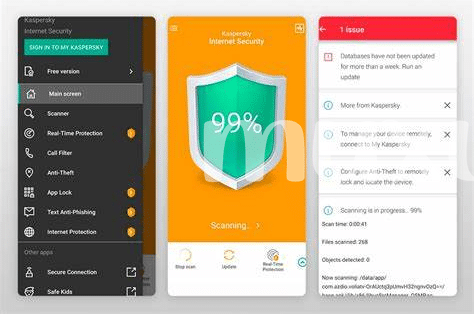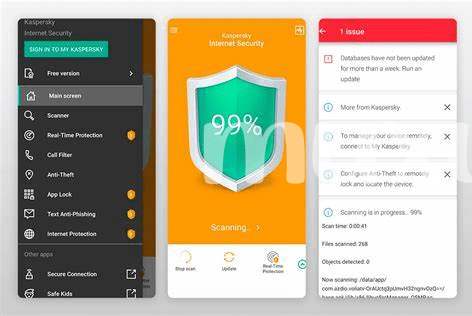- Understanding Android Security Risks 🛡️
- Evaluating Top Antivirus Apps for Android 📱
- Strategies for Secure App Downloading and Installation 📥
- Best Practices for Safe Internet Browsing 🌐
- Protecting Personal Data on Android Devices 📋
- The Future of Android Security: Emerging Trends 🔮
Table of Contents
ToggleUnderstanding Android Security Risks 🛡️
Understanding Android security risks is essential for all users to safeguard their devices and personal data. With the increasing use of Android devices for everyday tasks, it’s crucial to be aware of potential vulnerabilities and threats. From malware and phishing attacks to insecure Wi-Fi connections, the spectrum of risks is broad and ever-evolving. By understanding these risks, users can take proactive measures to protect their devices and sensitive information.
| Common Android Security Risks |
| —————————— |
| Malware and Phishing Attacks |
| Insecure Wi-Fi Connections |
| App Permissions |
| Outdated Operating Systems |
| Lack of Mobile Security Apps |
By staying informed about emerging threats and adopting best practices, Android users can navigate the digital landscape with greater confidence and security. It’s not just about the present risks; it’s also about staying ahead of potential future threats and vulnerabilities. The more knowledgeable users are about Android security risks, the better equipped they’ll be to mitigate them effectively.
Evaluating Top Antivirus Apps for Android 📱
When it comes to ensuring the security of your Android device, the market is flooded with antivirus apps each claiming to offer the best protection. In 2024, the stakes are higher than ever, with cyber threats constantly evolving and becoming more sophisticated. As such, it’s crucial to evaluate the top antivirus apps available for Android to find the most effective defense for your device. From real-time scanning and malware detection to features like anti-theft functionality and VPN services, the range of offerings can be overwhelming. In this ever-changing landscape, staying informed about the latest advancements in antivirus technology is key to making the right choice for safeguarding your digital life.
At the intersection of technology and security, understanding the strengths and limitations of different antivirus apps is vital. By considering factors such as performance impact, user interface intuitiveness, and frequency of updates, users can make informed decisions to fortify their Android devices. In a world where our smartphones are central to both our personal and professional lives, the significance of choosing a reliable antivirus solution cannot be overstated. As the digital realm continues to expand, the importance of robust cybersecurity measures becomes even more pronounced. Choosing the right antivirus app for your Android device can make all the difference in staying one step ahead of potential threats and ensuring a safer digital experience.
Link to “https://androiduknewsetc.com/2024s-stealthiest-android-spy-apps-that-go-undetected” with anchor “what is the best spy app for Android in 2024”.
Strategies for Secure App Downloading and Installation 📥
When it comes to strategies for secure app downloading and installation on your Android device, it’s crucial to be vigilant and proactive in safeguarding your digital security. Always obtain apps from official app stores or reputable sources to mitigate the risk of downloading malicious software. Additionally, consider enabling app verification features on your device to ensure that only legitimate and safe applications are installed. Regularly updating your apps and operating system can also enhance security by addressing any known vulnerabilities. Taking these precautions can significantly reduce the likelihood of compromising your device’s security and protect your personal data from potential threats.
Ensuring the security of your Android device through safe app downloading and installation practices is an essential aspect of maintaining a secure digital environment. By implementing these strategies, you can minimize the inherent risks associated with downloading and installing applications, thereby safeguarding your device and personal information from potential cyber threats.
Best Practices for Safe Internet Browsing 🌐
When it comes to safe internet browsing on Android devices, there are several best practices to keep in mind. Firstly, it’s essential to keep your device’s operating system and all installed apps up to date to ensure that you have the latest security patches and bug fixes. Additionally, using a reputable and reliable web browser, and being cautious about the websites you visit can significantly reduce the risk of encountering malware or malicious content. Moreover, utilizing a virtual private network (VPN) can add an extra layer of security by encrypting your internet connection and hiding your online activities from potential threats. Lastly, being mindful of the permissions you grant to websites and being wary of suspicious links and pop-ups can help you to avoid falling victim to phishing attempts and online scams.
To stay ahead of emerging threats and protect your personal information, it’s crucial to adopt these best practices and stay informed about the latest developments in Android security.
For more information on Android security and related topics, you can check out this article on what is the best spy app for android in 2024.
Protecting Personal Data on Android Devices 📋
In today’s digital age, protecting personal data on Android devices is of paramount importance. With the increasing threat of cyberattacks and data breaches, it is crucial to implement proactive measures to safeguard sensitive information. From utilizing robust encryption methods to setting up biometric authentication, users can take advantage of innovative security features to fortify their personal data. Furthermore, staying vigilant against phishing attempts and employing two-factor authentication can add an extra layer of defense against unauthorized access. By staying informed about the latest security protocols and regularly updating their devices, Android users can significantly mitigate the risk of potential data compromises. As we continue to embrace the convenience of mobile technology, prioritizing the protection of personal data on Android devices will undoubtedly remain a top priority for users worldwide.
The Future of Android Security: Emerging Trends 🔮
The world of Android security is constantly evolving, and as we step into the future, there are emerging trends that will shape the way we protect our devices. One of the key trends to watch out for is the increasing use of artificial intelligence and machine learning in antivirus apps, allowing for more proactive and adaptive protection against constantly evolving malware and security threats. Additionally, with the rise of Internet of Things (IoT) devices and the interconnected nature of modern technology, there will be a greater focus on holistic security solutions that encompass not just smartphones and tablets, but also smart home devices, wearables, and other connected gadgets. This comprehensive approach to security will be crucial in safeguarding our personal data and privacy in an increasingly interconnected digital landscape.




